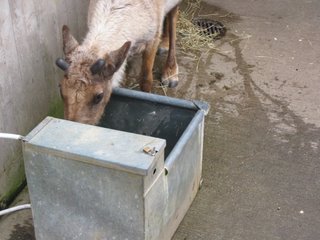For the returners...
In the light of the fact that I've recently had a couple of e-mails about this (and having noticably not posted anything at all about the process of moving home when I actually did!) I thought I'd add a bit of shpeal about what leaving JET was like for me.
First, to sum up my own experience: having agonised over my CV for almost a year (because of the handy yard-long JET application form it was my first time to write an actual CV) I chickened out of applying for jobs before I actually left Japan, figuring that, as I had no definite plans to study or join a post-grad training scheme, and with the difficulty of getting to interviews from Aomori, I would wait and see what was out there when I got back. I did get my CV finished, organise my references, have my CV checked by both acquaintances and independent careers advisors (if you were a UK student you can have a shot at this for free at www.prospects.ac.uk) and did plenty of research on what kind of jobs were available for someone with my "particular blend"(!!) of skills.
In the last couple of weeks before I left I sent in my CV to all the agencies I could find in London that specialised in recruiting Japanese/speaking staff and/or for Japanese companies. I got some responses, some junk-mail, with the serious ones inviting me to arrange an interview at the agency for after I returned. I had a couple of weeks in Aomori to relax and say goodbyes, came home in the middle of August, and had a week of saying hellos, before going for my agency interviews. These were a mixture of PC tests, CV review and interviews, partly in Japanese, and though not informal they were perfectly friendly and left me with a good idea of what to expect from the recruitment process. Just before the end of one of them I was given a free Japanese newspaper and asked how much of it I could read (not actually to read it though, again, phew!) and this resulted in my CV being sent to the company which in the end employed me.
I only registered with two agencies and heard from them both within that week to arrange interviews, although there was some overlap and I ended up just sticking with one agency. The limbo in between interviews was the worst part; I was quite bouyant and excited about the new opportunities (if nervous) while preparing for the interviews, but once they're done there's nothing more you can do but wait for a decision - so I made sure I had things to do during the days I wasn't up in London. The interviews themselves were fine; there were usually two interviewers, we talked about my CV and the job description and I tried to relax and let them make their assessments of whether they thought I would fit in at the company. The interviews were held mostly in English, although I suppose my interviewers were typical in wanting to see the level of my Japanese as well. One of my interviewers at the job I ended up taking had actually only just arrived there himself from Japan and it was his first time to interview in English - so I'm not sure who was more stressed out by that one!!
In the end I was made two offers, and my contacts at the agency were really supportive while I held out for the result of the job I really wanted. Putting me in for a job that was part translation was, after all, their idea! I don't think I would have thought of it myself but by the time of the second interview here I was determined that this was the job I wanted, something that would challenge me, and had to try and convince them of my ability to pick it up as I went along. I was asked to start only a week after my second interview - a month to the day after landing at Heathrow - although I had anticipated it taking far longer. I think that was more down to lucky coincidences and timing than anything else.
Recognising what skills you have gained on JET is key - JET as an experience gets talked down a lot as a 3-year-party, and it's very easy to start comparing yourself to other JETs, but don't underestimate or forget to point out on your CV all those basic things you learn from teaching and living in a foreign country - this differentiates you from many others at the outset. Teaching an over-packed class full of bored teenagers who neither speak your language nor share your culture gives you top-notch communication skills and confidence, if you've team-taught then that's your ability to work as part of a team box ticked, and surviving life in a foreign country says a lot about your independence, strength, and problem-solving abilities, as well as your capacity for getting on with those you have nothing in common with (hey, everyone knows at least one Canadian JET nearby...!!)
Then add to this a summary of all the things that made your JET experience personal to you - the things you did for school festival, your website, your club, your eikaiwa, your hobbies, the things you were curious about, and the skills you have gained or honed through pursuing these. Another way to do this is to find a typical list of "skills employers look for", and go through seeing where your activities fit in - doing this gave me a much broader appreciation of my basic skills and took the fear out of looking at the lists of requirements in job adverts. And don't forget you still have all the brilliant list of things you did before JET - now that JET takes up a chunk of your CV you only need to add in the real highlights ★
Finally, some advice: if I was to say just one thing, it would be get home before all the other JETs!! I really think coming home mid-August (of course I did moan about it at the time, why do people always have to get married in the summer??!) was crucial - one of my agencies said I was only the third JET to register with them, but come mid-September onwards they register upwards of 20 new returners every week. Of course it depends on whether you're heading to a big city and whether you are aiming to do a job that relates your "Japan experience" in some way - but if you are, then coming back early and getting a head start on the competition is possibly one of the single most effective things you can do. I know everyone wants to go home from JET the opposite way round the world via the Lost Kingdom of Obscure Backpackerness, so it's a matter of weighing up whether this can be done at a later time in order to take a lot of the pain out of the job-hunting process. After all, there were days in between interviews when I caught myself thinking, man I could have been in China by now...
Sorry for the length of this post, I hope it is of use/interest to some. The good news is, life after JET is definitely not as scary as it seemed a year ago!!









